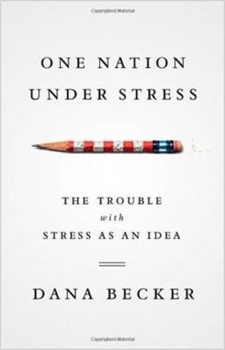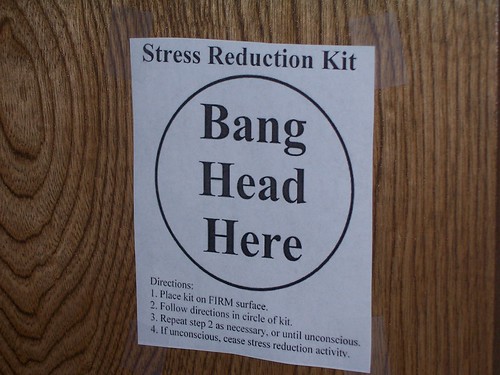
![]() Photo Credit: a n i. Y. via Compfight
Photo Credit: a n i. Y. via Compfight
April is “Stress Awareness Month” as sponsored by the “Health Resource Network” and April 16th specifically (the day after Tax Day) is “National Stress Awareness Day” in the United States.
When I first heard about these “holidays,” I thought it was pretty ridiculous. I think it’s safe to say we are all pretty aware of stress (maybe even too aware.) Warnings about stress, along with strategies to overcome it, seem to be found just about everywhere we look.
Stress is the #1 reason why people come to visit spas (the industry I work in) and my studies in positive psychology uncover a variety of interventions for managing stress from sleep, to exercise, to relationships, to positive experiences.
Not only do we have more than sufficient awareness of stress in our society, but we also have a healthy and growing body of research on strategies to combat it. So why does it feel like life keeps getting more stressful? What are we doing wrong?
 In a new book called “One Nation Under Stress: The Trouble with Stress as an Idea,” social work professor Dana Becker suggests that our efforts at stress relief have been misguided at best. In the past decades, we have focused our efforts on awareness, and individual responsibility, while ignoring the societal problems that are the root causes of human anxiety.
In a new book called “One Nation Under Stress: The Trouble with Stress as an Idea,” social work professor Dana Becker suggests that our efforts at stress relief have been misguided at best. In the past decades, we have focused our efforts on awareness, and individual responsibility, while ignoring the societal problems that are the root causes of human anxiety.
Although I think her book is based a little bit on a false dichotomy—presuming we should either take responsibility for our responses to stressors or address the societal factors that are at their root—I do agree with her criticism.
I have often felt, for example, that positive psychology would be far more effective if it pointed it’s lens at communal and societal wellbeing, rather than being almost exclusively oriented towards the individual pursuit of happiness (thankfully, some governments are beginning to discuss this idea.)
But here in the U.S., we live in an individualistic society, where people are expected to pull themselves up by their bootstraps. So when women (and particularly women with children) show increasing signs of stress, we don’t question our societal views towards families (my wife and I are always pleasantly surprised at the preferential treatment we get when traveling with children in other countries) and we accept as a fact of life the economic situation that pushes increasing numbers of households to pursue two incomes. Rather than questioning the cultural norms we are establishing in our society, we give women “tips” on how to manage their stress.
When soldiers come back from combat with post traumatic stress disorder, we don’t re-examine the true costs of warfare. We give our soldiers resilience training to teach them how to “bounce back” from traumatic experiences.

![]() Photo Credit: K Latham via Compfight
Photo Credit: K Latham via Compfight
And across a myriad of stressors from work, traffic, economic woes, racism, illness, etc. we coach individuals on how to keep stress at bay, through yoga, meditation, exercise, journaling, cognitive reframing, therapy, or even medication. And all of this stress-relieving activity makes us feel like we are doing something while we ignore the big problems of modern America.
Becker says that the first step in creating a different attitude towards stress is to recognize the vulnerability of the human condition. Stress is not a disease or disorder to be diagnosed and treated on an individual basis. It is a sign of our sensitivity to our surroundings and a gauge through which we can measure the health of our society.
Rather than trying to squelch the essential vulnerability that is a core facet of human nature, we should learn from it to make a better world. A world where there is more peace and less trauma, less inequality and poverty and more quality time to spend with loved ones, a world where there is less competition and more collaboration for the betterment of all.
So the real stress relief does not come from breathing exercises, scented candles and self-help books.; although those things may all help. Real stress relief comes from meaningful changes to our society that consider the vulnerability of humanity and create communities where flourishing can take place.
—
References and recommended reading:
Becker, D. (2013). One Nation Under Stress: The Trouble with Stress as an Idea. Oxford University Press.
by Jeremy McCarthy
Connect with me on facebook, twitter, or pinterest.
E-book available: The Psychology of Spas and Wellbeing.

Thank you for sharing this very important information and point of view in finding ways to create a better, healthier, happier, cleaner, more fulfilling world in which we can all live. This subject reminds me of Maslow’s Hierarchy of Needs. If we have our survival needs met, [CAWS-Clean Air Water Soil (for food), along with shelter and sex] we can then begin to look inward, upward and outward. The daily battle for survival is far too real for far too many. Those not currently destitute look out at their neighbors and see those that are, and that scares us…”that could be me.”
Your last sentence sums it up perfectly; let’s focus our efforts on MEANINGFUL changes that will benefit the individual and humanity. After all, there are billions of individuals, all wanting love, success and enlightenment, but I bet many would be happy with a warm bed and nourishing food as a start.
Hmmm. National Stress Awareness is on my birthday! Not sure how to respond to that tidbit.
I guess to be aware of stress all day and let it fly away from the world and me, too!
Well said, Jeremy that we are individuals, but we surely as heck do not live in separate fish bowls. We live on the Earth’s terra firma together. That old Coke song lingers, “I’d like to buy the world a Coke…and live in perfect harmony…”
Many thanks!
Great post Jeremy. Here in New Zealand we’ve just completed the first round of a national wellbeing survey (n = 10,009) which at least will provide us with the evidence to direct meaningful change. My take on positive psychology has always been “what can we do to promote positive mental health at the population level” rather than focusing on individual change. I totally agree with you that avoiding stress starts with national policies that support secure infant attachment and go forward from there.
We do need to look at root causes – that’s for sure! I’ve often felt that child-raising, for example, is done “all wrong” in Canada and the US where we expect women to just go home and “know” how to look after their children by themselves or, if they’re fortunate, with a caring partner. Long gone are the days of “it takes a village to raise a child”. Additionally, it’s so easy to “get” stress and very long and possibly difficult to “remove” stress or anxiety. Let’s take care of the root societal causes so that we have less work to do with so many individuals. Thanks for raising this as an important topic!
Judy, It is not surprising that your birthday is on Stress Awareness Day. It is like you are a stress-relieving gift to the world bringing joy to everyone you meet!
Colleen, I think sometimes that not enough people think “that could be me” when they see those who are struggling. Thanks for reminding us of Maslow!
Hi Lucy, I hope you will offer to write a guest post with the results of your national wellbeing survey. I wonder how controversial this is in your country as it surely would be here. I am heartened to see governments beginning to pursue this line of questioning to help guide policy discussions, but some view this as overstepping the bounds of government.
Lisa, I’m a big believer in the “it takes a village” philosophy. When I lived in Hawaii they have a lovely culture of referring to all the friends of a parent as auntie and uncle. It creates a large extended family for a child and I believe this simple designation helps to enroll these friends in taking some responsibility for the care and wellbeing of the children. So if you ever come to my house for dinner some time (and you’re always welcome!) you will be Auntie Lisa!
Also, my favorite part of the “Happy” documentary was the family who lived in the commune. I think we have indeed lost something in our individualistic societies.
Awww, shucks, Jeremy!
And YOU are the gift that keeps on giving! And I know we ALL are so grateful for your wisdom, kind, generous words and LOVE!
I am sending you the mariachi music blasting on the Banderas Beach below.
Cheers fro PV!